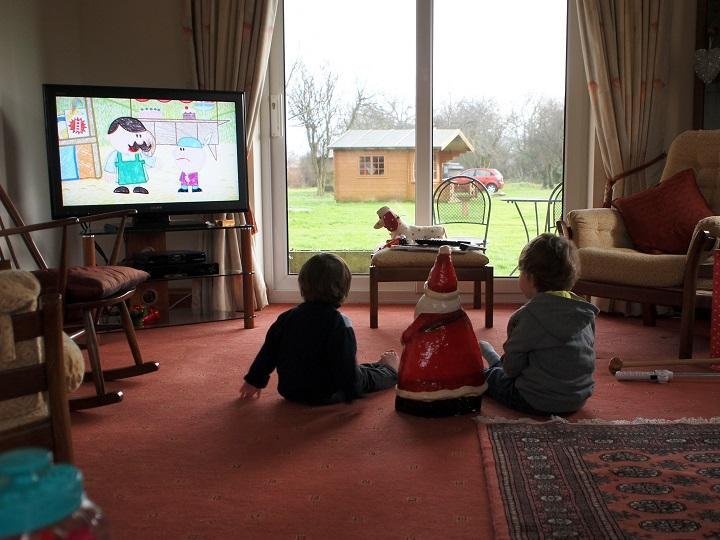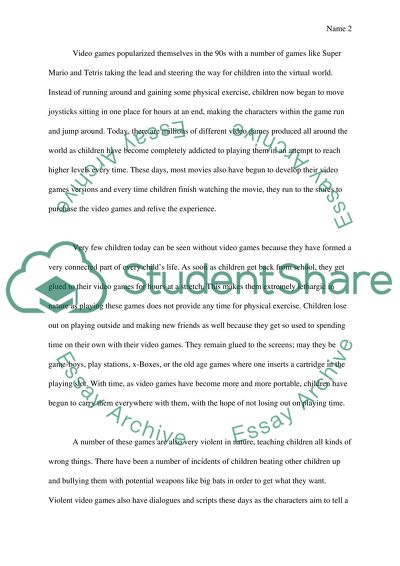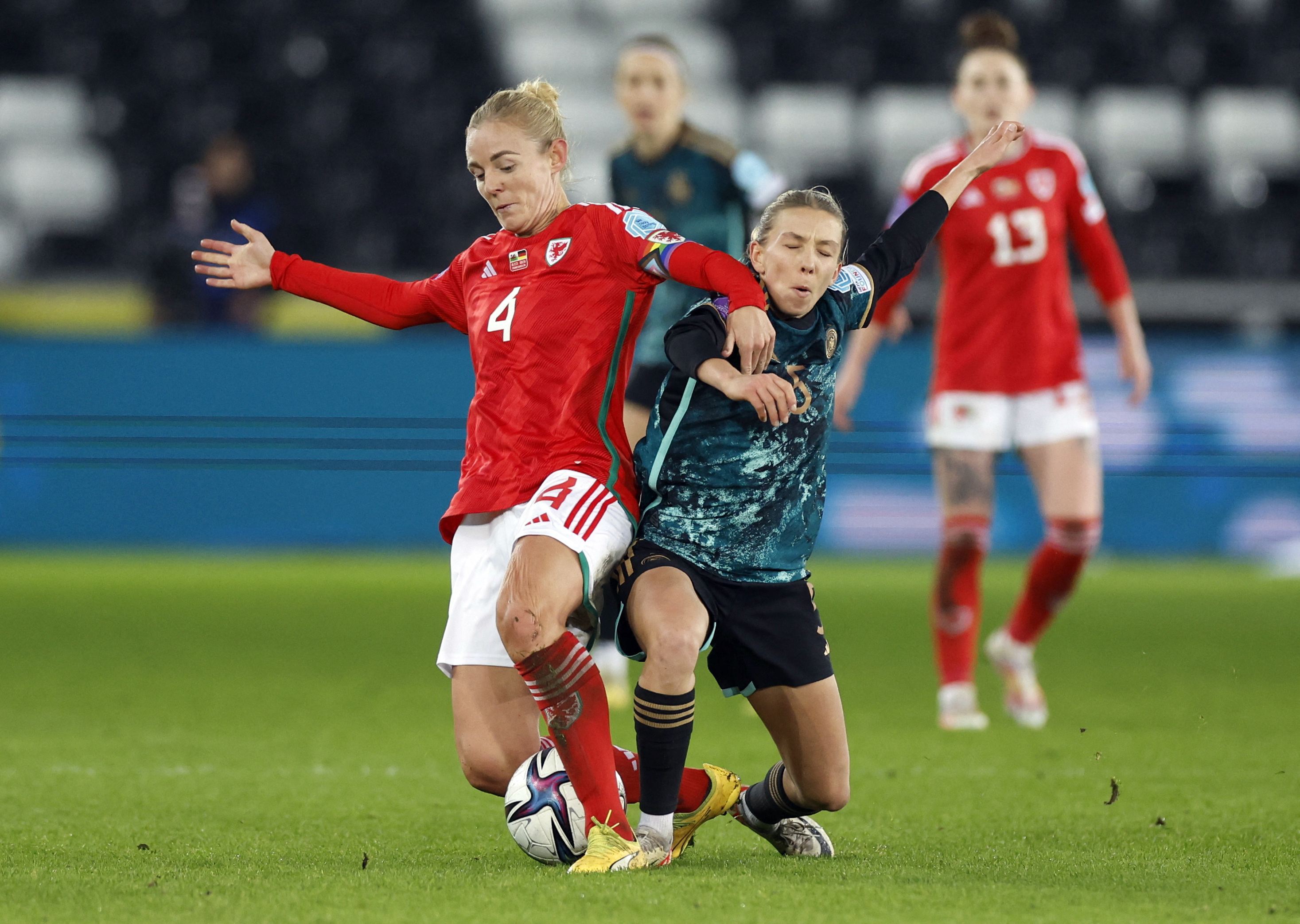

Essay on Video Games Boon Or Bane
Students are often asked to write an essay on Video Games Boon Or Bane in their schools and colleges. And if you’re also looking for the same, we have created 100-word, 250-word, and 500-word essays on the topic.
Let’s take a look…
100 Words Essay on Video Games Boon Or Bane
Introduction to video games.
Video games are like digital playgrounds. Many people, especially kids and teenagers, love playing them. They can be played on computers, consoles, or even phones.
Video Games as a Boon
Video games can be good for you. They help make your mind sharp by solving puzzles and making quick decisions. Some games even teach you about history, science, and other subjects.
Video Games as a Bane
But, spending too much time on video games can be bad. It can make you sit in one place for too long, which is not healthy. Also, too much gaming can keep you from studying or playing outside.
In the end, video games can be both good and bad. It all depends on how and how much you play. Balance is key.
250 Words Essay on Video Games Boon Or Bane
Video games: a double-edged sword.
Video games have become an integral part of our lives and have captivated people of all ages. They offer a thrilling escape from reality, a chance to connect with friends, and a way to challenge oneself. However, the impact of video games on our lives can be both positive and negative.
Positive Effects of Video Games
Video games can provide several benefits, including:
- Enhanced problem-solving skills: Many games require players to solve puzzles and make strategic decisions, which can help improve problem-solving abilities in real life.
- Improved hand-eye coordination: Playing video games often involves using a controller or keyboard, which helps develop hand-eye coordination and reaction times.
- Stress relief: For many people, playing video games can be a fun and relaxing way to relieve stress and unwind after a long day.
- Social interaction: Multiplayer games allow players to connect with others from around the world, fostering social interaction and teamwork.
Negative Effects of Video Games
Despite the benefits, video games can also have negative consequences, such as:
- Addiction: Some people may become addicted to video games, spending excessive amounts of time playing and neglecting other important aspects of their lives.
- Violence and aggression: Some video games contain violent content that can desensitize players to violence and increase aggressive behavior.
- Health problems: Excessive gaming can lead to health issues such as sleep deprivation, obesity, and eye strain.
- Social isolation: Spending too much time playing video games can lead to social isolation and withdrawal from real-world interactions.
Video games can be both beneficial and harmful, and it is important to use them in moderation. Parents and guardians should monitor their children’s video game usage, ensuring that they are playing age-appropriate games and not spending excessive amounts of time playing. By striking the right balance, video games can be enjoyed as a fun and enriching part of life without causing negative consequences.
500 Words Essay on Video Games Boon Or Bane
Video games are like a modern playground for many people, especially kids and teenagers. They are games that we play on devices like computers, consoles, and phones. Some people say video games are really good for us, while others think they can be bad. Let’s talk about both sides to understand if video games are a boon (which means something helpful) or a bane (which means something harmful).
The Good Side of Video Games
First, let’s look at why video games might be good for us. One big reason is they can make our brains work better. When we play games that need a lot of thinking, like puzzles or strategy games, it helps our brain to think faster and solve problems better. Video games can also teach us new things, like history from a game set in the past, or how to manage resources in a simulation game.
Playing video games can also help us feel less alone. Many games let us play with or talk to other people online. This can help us make new friends who like the same games as we do. For some, these games are a way to relax and have fun after a long day of school or work.
The Not-So-Good Side of Video Games
But, video games can also have a not-so-good side. If we spend too much time playing them, it can make us sit in the same spot for too long, which isn’t good for our health. It’s important to move around and play outside too.
Another problem is that some games can make people feel angry or frustrated. This usually happens when a game is too hard, or when someone keeps losing to other players online. It’s important to remember that it’s just a game and not worth getting upset over.
Sometimes, people spend a lot of money on video games, buying new games all the time or paying extra money inside the game. This can be a lot, especially if it’s money that was supposed to be used for other things.
Finding a Balance
So, are video games a boon or a bane? The answer is, it depends on how we use them. They can be really good for us if we play them in a healthy way. This means not playing for too long at a time, picking games that are right for our age, and making sure we still spend time doing other things we enjoy or need to do, like homework, sports, or spending time with family.
It’s like eating candy. A little bit can be a nice treat, but too much can make you feel sick. The key is finding the right balance that keeps video games as a fun part of our lives without letting them cause problems.
In the end, video games themselves are neither just good nor bad. They become a boon or a bane based on how we choose to play them. By playing responsibly and making smart choices about the games we play, we can enjoy all the fun parts of video games without running into the problems they might cause.
That’s it! I hope the essay helped you.
If you’re looking for more, here are essays on other interesting topics:
- Essay on Value Of Nature
- Essay on Value Of Love
- Essay on What Makes Life Worth Living
Apart from these, you can look at all the essays by clicking here .
Happy studying!
Leave a Reply Cancel reply
Your email address will not be published. Required fields are marked *
Save my name, email, and website in this browser for the next time I comment.
Gaming- a bane or a boon-a systematic review
Affiliations.
- 1 National Institute of Mental Health and Neurosciences (NIMHANS), 560029, Bengaluru, Karnataka India. Electronic address: [email protected].
- 2 National Institute of Mental Health and Neurosciences (NIMHANS), 560029, Bengaluru, Karnataka India.
- PMID: 30939393
- DOI: 10.1016/j.ajp.2019.03.001
Recent trends show online/video games, have shifted from being just recreational in nature, to hazardous even resulting in the gamer's death like the blue whale game. The aim of the study is to examine associations between video/online gaming and its implication on the biopsychosocial domains of the user. Online databases were studied on gaming and its effect on behaviour, general and mental health from 1997-2017. The PICO guidelines, PRISMA flow diagram and the Rayyan software was used in identifying relevant studies. Cross referencing was done with the co-authors. A total of 41 studies were included in the final analysis. The choice of the video game is influenced by age, gender, parental mediation, as well as the players' and the game's characteristics. Excessive gaming affects both the individual himself and their interpersonal relationships, with 'internet addiction' being added as a diagnosis under DSM V. Despite its several negative consequences, over the past decade, researchers have now started to acknowledge the benefits of gamification in social, educational and even in the health sector, irrespective of the individual's age. There is a need to develop cross cultural database to understand the impact of addictive and/or promotive use of games on the biopsychosocial factors of the gamer.
Keywords: Consequences; Gaming; Gender; Influencing factors; Lifestyle; Psychosocial factor.
Copyright © 2019 Elsevier B.V. All rights reserved.
Publication types
- Systematic Review
- Behavior, Addictive* / epidemiology
- Child, Preschool
- Internet* / statistics & numerical data
- Life Style*
- Video Games* / statistics & numerical data
- Young Adult
- Managing Child Behaviour
Does your child love playing video games? Here is how they may impact him
Parents often worry that playing video games can hamper childrens ability to interact with the outside world. What does science say? We examine the effects of gaming and what parents can do to help

"You will become antisocial," declares 13-year-old Rohan's mother. The teenager stays awake till late in the night, hooked to his Xbox and sometimes interacts very little with his family. His mother is exasperated by his obsession with the world of gaming. She worries that her son may start displaying violent behavior and a lack of social skills because of constant exposure to video games.
Is our fear of the adverse effects of computer and video games real? There is research pointing to both the positive and negative effects of gaming. While some games are non-threatening and can improve concentration and creative skills, violent, dark games may foster an appetite for violence and destructive behavior. Many of the concerns that parents may have about the adverse effects of television are also true for video games -- in terms of violence, minimal physical activity, sedentary lifestyle and so on. In fact, the 'it will melt your brain' theory may hold some truth as recent research has shown.
What studies say

A recent study by researchers at the Universit de Montral and published in the journal Molecular Psychiatry reveals that certain video games can do more harm than good. According to the study, shooter games were found to cause damage to the hippocampus of the brain and video gamers who were examined as part of the research, had less grey matter than their counterparts who did not play these games.
In an article in Psychology Today , Samantha Smithstein, clinical and forensic psychologist explains that for young people who struggle with social skills or lack the skills to play team sports, video games entertain and level the playing field. Young people with little athletic interest or ability have an opportunity to compete in a different way and to form friendships with like-minded gamers, she says.
But here is a word of caution -- recent surveys have shown that children, especially teenagers spend an average of almost an hour every day on video games, with some being engaged up to three hours. This can interfere with sleep, playing outdoors and studies.
"If a young person spends most non-school hours on the computer or hand-held device or phone, is falling behind with assignments, has worsening grades, is overtired, lying about frequency of use of electronic media, irritable when not using electronic media and choosing these activities overseeing friends, then the child has a problem and needs help," adds Dr Samantha.
So, to put it in perspective, we list out the various effects of video games on children.
Positive effects of video games
- Can improve focus in children with a short attention span
- Develops better eye-hand coordination
- Can boost imagination and sometimes be educational
- Develops the spirit of healthy competition
Negative effects of video games
- May promote violent behavior
- Can cause some damage to the brain
- Hampers social interaction with the outside world
- Physical inactivity can lead to health problems
Aparna Rao Vaaram, homemaker and mother to an 11-year-old boy and a teenage girl, says -- "My daughter is not interested in gaming but my son likes playing video games once in a while. I do not object to games, which make children think, use their imagination or work out a solution. But I don't allow him to play games that have violence because those images keep playing on their mind. Also, we limit the screen time and PS4 is only allowed on the weekends. I feel even the good games should be played in moderation as they take away the physical activity time.
Akanksha Deshpande, clinical psychologist and assistant professor at Shri Ramdeobaba College of Engineering and Management, Nagpur, says factors such as duration and frequency of gaming, the nature of games: aggressive, passive or creative; whether the gaming sessions are monitored by parents to ensure age-appropriate content; the interface of the games so that it doesn't damage sensory abilities and addictive nature of the games need to be kept in mind when dealing with children playing video games.
"Playing video games leads to instant gratification, so children can encounter psycho-social adjustment problems and too much dependence on games might distract them from studies and affect interpersonal relations. In case of failure of parental control, in terms of content and duration of time spent in gaming, it is possible that the everyday activities including homework and assignment completion will be hampered. Also, rather than spending time outdoors, playing with real people, the child is often lost in the virtual world of gaming, which in return takes him away from reality," she adds.
"Gaming is definitely not a bane if all the above-discussed measures are taken care of," Prof Deshpande concludes.
What parents can do
Here are 5 tips to help parents regulate their children's video game craze.
1. Set a time limit -- There is no prescribed format in terms of how much is too much. You can allow children to play video games for around one hour per week.
2. Check the rating system -- Limit the exposure to undesirable video games by checking on the rating systems for video games. This helps in deciding if a particular game is harmful to the child.
3. Promote physical activity -- Enrol your preteen into a sporting activity or tell her to get outdoors and play
4. Bond with neighborhood friends -- Encourage your child to make real-life friends and to have face-to-face conversations rather than on the Internet.
5. Talk to your child -- Lack of communication can be the biggest culprit. Have a chat with your teen about the harm video games can cause and why these should be played in moderation.

Comment Flag
Abusive content
Inappropriate content
Cancel Update
Related Topics
More for you.
Explore more articles and videos on parenting

Pre-schooler to Pre-teen • 15 Mins Read • 5.3K Views
If You Think Screen Time Is Bad, Here’s Good News: Screen-Based Activities Can Improve Your Child’s Learning
Television, smartphones, computers and video games can provide a great educational experience for your child. Find out how high-quality content, and watching programs with your child and talking about them can enhance learning.

Primary to Parent • 13 Mins Read • 2.2K Views
Screen over sleep—Is binge-watching taking a toll on your family life?
Thanks to the rise of mobile entertainment, binge-watching is the new phenomenon that’s taking a toll on family life, with sleep patterns taking the worst hit. Our expert analyses

Primary to Pre-teen • 6 Mins Read • 9.7K Views
What Kids Feel About Their Parents' Use Of Gadgets. Parents, Take A Look
As parents, we often admonish our kids for the excess usage of gadgets. But do we wonder if we ourselves are overdoing it? More so during the pandemic, when our world has become one giant online microcosm
- Communities
Join a community to interact with like-minded parents and share your thoughts on parenting

2.5K members • 51 Discussions
Curiosity, tantrums and what not!

1.9K members • 36 Discussions
The Active and Enthusiastic Middle Years

11-18 Years
1.8K members • 61 Discussions
From Self-consciousness to Self-confidence

Just for Parents
4K members • 149 Discussions
A 'ME' space to just BE!
Discussions Topics
Share your thoughts, parenting tips, activity ideas and more
Hobbies and Entertainment
New member introduction.

Family Fun Challenges and Activities
- Gadget Free Hour
- Discussions
Share your thoughts, tips, activity ideas and more on parenting
It Takes a Village to Support a New Mom!
Free summer camps in hyderabad, parent sessions, self introduction, the 4th edition of #raisingboys campaign 2024 is on.
A compilation of the most-read, liked and commented stories on parenting


How to Teach Your Child Tolerance
8 Mins Read • 5.7K Views

How To Get Through To Your Teen: A Conversation With A Mother And Her Daughter
10 Mins Read • 4K Views

Help Your Child Socialise
8 Mins Read • 3.7K Views

5 Things You Should Stop Expecting From Your Child
7 Mins Read • 15.5K Views

Why Babies and Toddlers Shouldn't Watch TV
7 Mins Read • 5.6K Views

How to Handle Pester Power
9 Mins Read • 384 Views
Top Searches
- Notifications
- Saved Stories
- Parents of India
- Ask The Expert
- Community New
- Community Guideline
- Community Help
- The Dot Learning Circle
- Press Releases
- Terms of use
- Sign In Sign UP
We use cookies to allow us to better understand how the site is used. By continuing to use this site, you consent to this policy. Click to learn more
- Free Samples
- Premium Essays
- Editing Services Editing Proofreading Rewriting
- Extra Tools Essay Topic Generator Thesis Generator Citation Generator GPA Calculator Study Guides Donate Paper
- Essay Writing Help
- About Us About Us Testimonials FAQ
- Studentshare
- Video Games Boon or Bane
Video Games Boon or Bane - Research Paper Example

- Subject: Technology
- Type: Research Paper
- Level: College
- Pages: 5 (1250 words)
- Downloads: 2
- Author: antwan66
Extract of sample "Video Games Boon or Bane"
- Should Video Games Be Considered A Sport
- Cited: 1 times
- Copy Citation Citation is copied Copy Citation Citation is copied Copy Citation Citation is copied
CHECK THESE SAMPLES OF Video Games Boon or Bane
Press releases and the olympic games: effective marketing, media entertainment, emerging themes project: the toys and games industry, peculiarities of client relationship marketing, from pac man to grand theft auto, some novels in consumer electronics and software, psychological and legal perspectives of digital media, who is emmahdorable.

- TERMS & CONDITIONS
- PRIVACY POLICY
- COOKIES POLICY

The Internet – Boon or Bane Essay For Students
The internet has become a very common thing these days. Almost everyone uses it whether they are young or old. But is the internet only good or does it also have some disadvantages? In this essay, I will talk about how the internet can be helpful but also how it can cause some problems.
Table of Contents
Internet: Boon or Bane Essay
Internet – a great learning tool.
First of all, the internet is a great way to learn new things. If I have any homework or school projects, I can easily search online and find lots of information. Whether I need to know about history, science, or any other subject, the internet has answers to all my questions. I don’t need to spend time in the library searching through books. Another cool thing is I can watch interesting educational videos to learn in a fun way. YouTube has many channels for kids where I can learn about animals, places, and inventors, and discover new things.
Sometimes teachers also ask us to research online and then share what we found with the class. This makes learning more interesting than just reading from textbooks. I think in the future more and more learning will happen through the Internet as there is so much to explore. It has opened doors of knowledge for students.
Easy Communication Tool
Apart from studies, the internet also allows me to stay in touch with my friends anytime, anywhere. Before the Internet, we could only meet during school or after school activities. But now we chat on WhatsApp and Instagram daily. We share photos, and videos and talk about our day. It’s fun discussing homework and class activities online too. Even if one of my friends is not feeling well, we can video call and cheer them up. The Internet has made the world a smaller place and connects people easily.
Some Downsides of the Internet
While the internet has many perks, it also has a dark side. If not used carefully, it can distract us and even affect our health and privacy. Let me discuss some potential problems:
Wasting Time Online
The biggest issue I face is not being able to control my internet usage. It’s so easy to get hooked on watching random videos or playing online games for hours without realizing time passing by. Before I know, my homework and study time is over! I end up feeling guilty. To avoid this, I have made a rule to only go online after completing my daily tasks.
Effects on Health
Sitting for long hours staring at the screen is definitely not good for the eyes or the body. It can cause issues like headaches, back pain, and eye strain. Doctors say we should take short breaks every 30 minutes to relax our eyes and move around. Gaming late at night can also disturb sleep cycles which affects the next day’s activities and studies. Moderation is key to staying fit while using the internet.
Cyberbullying Problem
Sometimes mean or rude kids like to post mean comments about others online. This type of bullying over social media or messaging apps is called cyberbullying. It can really hurt feelings and even scare some kids. We have to be very careful about what we share and avoid saying bad things that can upset our friends. If someone bothers us, it’s always better to block and tell a parent or teacher for help.
Privacy Risks
Our personal information like photos, school name, address or phone numbers should not be shared freely with strangers online. Anyone can pretend to be nice but have bad intentions. We have to keep passwords secure and not click random links from unknown people. Some websites or apps also like to collect our data without permission which makes privacy a concern.
Addiction to Games and Social Media
Endless scrolling on social media or getting immersed in online multiplayer games can become addictive without noticing. This habit takes away time from other important activities. I have to keep checking on not overusing any sites or apps and taking tech breaks when needed. Balance is a must for well-being.
In summary, the internet provides tremendous possibilities for learning, creativity, and connection when used responsibly. However, it can negatively impact us if overused or misused. Everything in moderation is key. By taking precautions like limiting screen time, and being careful about privacy and cyber safety, we can happily explore the wonderful world of online without any troubles. The power is in our hands to make the internet a boon rather than a bane.

Hello! Welcome to my Blog StudyParagraphs.co. My name is Angelina. I am a college professor. I love reading writing for kids students. This blog is full with valuable knowledge for all class students. Thank you for reading my articles.
Related Posts:

Leave a Reply Cancel reply
Your email address will not be published. Required fields are marked *
Save my name, email, and website in this browser for the next time I comment.
- Share full article

Is Guyana’s Oil a Blessing or a Curse?
More than any single country, Guyana demonstrates the struggle between the consequences of climate change and the lure of the oil economy.
With the discovery of offshore oil, Guyana is now building a natural gas pipeline to bring the byproducts of oil production to a planned energy plant. Credit...
Supported by
By Gaiutra Bahadur
Photographs by Keisha Scarville
- March 30, 2024
Basjit Mahabir won’t let me in.
I’m trying to persuade Mr. Mahabir to open the padlocked gate of the Wales Estate, where he guards the ramshackle remains of a factory surrounded by miles of fallow sugar cane fields. The growing and grinding of sugar on this plantation about 10 miles from Georgetown, Guyana’s capital, ended seven years ago, and parts of the complex, its weathered zinc walls the color of rust, have been sold for scrap.
I plead my case. “I lived here when I was a little girl,” I say. “My father used to manage the field lab.” Mr. Mahabir is friendly, but firm. I’m not getting in.
The ruins are the vestiges of a sugar industry that, after enriching British colonizers for centuries, was the measure of the nation’s wealth when it achieved independence.
Now the estate is slated to become part of Guyana’s latest boom, an oil rush that is reshaping the country’s future. This nation that lies off the beaten track, population 800,000, is at the forefront of a global paradox: Even as the world pledges to transition away from fossil fuels , developing countries have many short-term incentives to double down on them.
Before oil, outsiders mostly came to Guyana for eco-tourism, lured by rainforests that cover 87 percent of its land. In 2009, the effort to combat global warming turned this into a new kind of currency when Guyana sold carbon credits totaling $250 million, essentially promising to keep that carbon stored in trees. Guyana’s leadership was praised for this planet-saving effort.
Six years later, Exxon Mobil discovered a bounty of oil under Guyana’s coastal waters. Soon the company and its consortium partners, Hess and the Chinese National Offshore Oil Corporation, began drilling with uncommon speed. The oil, now burned mostly in Europe, is enabling more global emissions — and producing colossal wealth.
The find is projected to become Exxon Mobil’s biggest revenue source by decade’s end. The deal that made it possible — and which gave Exxon Mobil the bulk of the proceeds — has been a point of public outcry and even a lawsuit, with a seeming consensus that Guyana got the short end of the stick. But the deal has nonetheless generated $3.5 billion so far for the country, more money than it has ever seen, significantly more than it gained from conserving trees. It’s enough to chart a new destiny.
The government has decided to pursue that destiny by investing even further in fossil fuels. Most of the oil windfall available in its treasury is going to construct roads and other infrastructure, most notably a 152-mile pipeline to carry ashore natural gas, released while extracting oil from Exxon Mobil’s fields, to generate electricity.
The pipeline will snake across the Wales Estate, carrying the gas to a proposed power plant and to a second plant that will use the byproducts to potentially produce cooking gas and fertilizer. With a price tag of more than $2 billion, it’s the most expensive public infrastructure project in the country’s history. The hope is that with a predictable, plentiful supply of cheap energy, the country can develop economically.
At the same time, climate change laps at Guyana’s shores; much of Georgetown is projected to be underwater by 2030.

Countries like Guyana are caught in a perfect storm where the consequences for extracting fossil fuels collide with the incentives to do so. Unlike wealthy countries, they aren’t responsible for most of the carbon emissions that now threaten the planet. “We’re obviously talking about developing countries here, and if there’s so much social and economic development that still needs to happen, then it’s hard to actually demand a complete ban on fossil fuels,” says Maria Antonia Tigre, a director at the Sabin Center for Climate Change Law at Columbia University. Still, she insists, “we’re in a moment in the climate crisis where no one can get a pass.”
This struggle between the existential threats of climate change and the material gains dangled by fossil fuels bedevils rich countries, too. The International Energy Agency predicts that oil demand will peak in five years as big economies transition to renewable sources. But it is a transition of indeterminate length, and in the meantime, the Biden administration approved drilling in the Alaska wilderness just last year, and the United States is producing more oil than ever in its history. A country like Guyana, with an emerging economy, has even more reason to jump at temptation.
The country has already been transformed. Next to its famously elegant but decaying colonial architecture, new houses, hotels, malls, gyms and offices of concrete and glass crop up constantly. Trucks carrying quartz sand for all this construction judder along the highways. While nearly half of Guyanese still live below the poverty line, the country is bustling with possibility, and newcomers arrive from around the world. During a five-month stay there, I met a logistics manager from Sri Lanka, a nightclub singer from Cuba, a Briton developing a shrimp farm and a Nigerian security guard who joked that a sure sign that Guyana had become a hustler’s paradise was that he was there.
As I survey the stranded assets of the sugar works on the Wales Estate, imagining the steel pipes to come, the gleaming future Guyana’s government promises feels haunted by its past as a colony cursed by its resources. The potential for the petroleum boom to implode is in plain sight next door, where Venezuela — which has recently resurrected old claims to much of Guyana’s territory — is a mess of corruption, authoritarian rule and economic volatility.
For centuries, foreign powers set the terms for this sliver of South America on the Atlantic Ocean. The British, who first took possession in 1796, treated the colony as a vast sugar factory. They trafficked enslaved Africans to labor on the plantations and then, after abolition, found a brutally effective substitute by contracting indentured servants, mainly from India. Mr. Mahabir, who worked cutting cane for most of his life, is descended from those indentured workers, as am I.
Fifty-seven years ago, the country shook off its imperial shackles, but genuine democracy took more time. On the eve of independence, foreign meddling installed a leader who swiftly became a dictator. Tensions between citizens of African and Indian descent, encouraged under colonialism, turned violent at independence and set off a bitter contest for governing supremacy that continues to this day. Indigenous groups have been courted by both sides in this political and ethnic rivalry.
It wasn’t until the early 1990s that Guyana held its first free and fair elections. The moment was full of possibility. The institutions of democracy, such as an independent judiciary, began to emerge. And the legislature passed a series of robust environmental laws.
Now that Exxon Mobil has arrived to extract a new resource, some supporters of democracy and the environment see those protections as endangered. They criticize the fossil-fuel giant, with global revenue 10 times the size of Guyana’s gross domestic product, as a new kind of colonizer and have sued their government to press it to enforce its laws and regulations. The judge in one of those cases has rebuked the country’s Environmental Protection Agency as being “submissive” toward the oil industry.
Addressing some of these activists at a recent public hearing, Vickram Bharrat, the minister of natural resources, defended the government’s oversight of oil and gas. “There’s no evidence of bias toward any multinational corporations,” he said. Exxon Mobil, in an emailed statement, said its work on the natural gas project would “help provide lower-emissions, reliable, gas-powered electricity to Guyanese consumers.”
The world is at a critical juncture, and Guyana sits at the intersection. The country of my birth is a tiny speck on the planet, but the discovery of oil there has cracked open questions of giant significance. How can wealthy countries be held to account for their promises to move away from fossil fuels? Can the institutions of a fragile democracy keep large corporations in check? And what kind of future is Guyana promising its citizens as it places bets on commodities that much of the world is vowing to make obsolete?

A land of new possibilities
Oil has created a Guyana with pumpkin spice lattes. The first Starbucks store appeared outside the capital last year; it was such a big deal that the president and the American ambassador attended the opening. People still “lime” — hang out — with local Carib beer and boomboxes on the storied sea wall, but those with the cash can now go for karaoke and fancy cocktails at a new Hard Rock Cafe.
The influx of wealth has introduced new tensions along economic lines in an already racially divided country. Hyperinflation has made fish, vegetables and other staples costlier, and many Guyanese feel priced out of pleasures in their own country. A new rooftop restaurant, described to me as “pizza for Guyana’s 1 percent” by its consultant chef from Brooklyn, set off a backlash on social media for serving a cut of beef that costs $335, as much as a security guard in the capital earns in a month.
This aspirational consumerist playground is grafted onto a ragged infrastructure. Lexus S.U.V.s cruise new highways but must still gingerly wade through knee-deep floods in Georgetown when it rains, thanks to bad drainage. Electricity, the subject of much teeth-sucking and dark humor, is expensive and erratic. It’s also dirty, powered by heavy fuel, a tarlike residue from refining oil. In 2023, 96 blackouts halted activity across the country for an average of one hour each. A growing number of air-conditioners taxing aging generators are partly to blame, but the system has been tripped up by weeds entangling transmission lines, backhoes hitting power poles and once, infamously, a rat.
The country’s larger companies — makers of El Dorado rum, timber producers — generate their own electricity outside the power grid. Small companies, however, don’t have that option. This year, the Inter-American Development Bank cited electrical outages as a major obstacle to doing business in Guyana.
The government’s investment in a natural gas pipeline and power plant offers the prospect of steady and affordable power. The gas, a byproduct of Exxon Mobil’s drilling, tends not to be commercialized and is often flared off as waste, emitting greenhouse gases in the process. But at the government’s request, Exxon Mobil and its consortium partners agreed to send some of the natural gas to the Wales site. The consortium is supposed to supply it without cost, but no official sales agreement has been made public yet.

At international conferences, rich countries have pledged to help poorer, lower-emitting ones to raise their living standards sustainably with renewable energy, but the money has fallen short . Natural gas is cleaner than the heavy fuel Guyana now uses, and the country’s leaders claim that it will serve as an eventual bridge to renewable energy. The fact that it’s not as clean as solar or other renewable sources seems, to some local manufacturers, beside the point because the status quo is so challenging.
During blackouts, Upasna Mudlier, who runs Denmor Garments, a textile company that makes uniforms, fire safety jackets and lingerie, has to send home the two dozen seamstresses she employs. That means a big hit in productivity. A chemist in her late 30s, she inherited the company from her father. Ms. Mudlier was nervous about networking in the burly crush of the male-dominated local business elite, but she nonetheless attended an event hosted by a business development center funded by Exxon Mobil. She leaned in, and it paid off: She won a contract to make a thousand coveralls for workers building an oil production vessel headed for Guyana’s waters.
It was a bright spot nonetheless dimmed by her electric bill. An astounding 40 percent of her operating budget goes to paying for power. Ms. Mudlier is eager for the natural gas plant. Cheaper, reliable energy could allow her to price her products to compete internationally.
Textiles are a tiny niche in Guyana, but hers is the kind of manufacturing that experts say Guyana needs to avoid becoming a petroleum state. Ms. Mudlier agrees with the government’s messaging on the gas project. “It will create more jobs for people and bring more investments into our country and more diversity to our economy,” she said.
Widespread anxiety that the best new jobs would go to foreigners led to a law that sets quotas for oil and gas companies to hire and contract with locals. Komal Singh, a construction magnate in his mid-50s, has benefited from the law. Mr. Singh, who directs an influential government advisory body on business policy, works as a joint partner with international companies building the Wales pipeline and treating toxic waste from offshore oil production.
“We say to them, ‘It’s you, me and Guyanese,’” he told me. “If Guyanese are not part of the show, end of conversation.”
Guyana has lost a greater share of its people than any other country, with two in five people born there living abroad. So the oil boom and the local partner requirement have set off something of a frenzy for passports and have fueled debate over who, exactly, is Guyanese. I met a British private equity manager with a Guyanese mother who obtained citizenship shortly after his second visit to the country. One local partner’s contested citizenship became a matter for the High Court.
With the value of land and housing skyrocketing, some local property owners have profited by becoming landlords to expats or by selling abandoned fields at Manhattan prices for commercial real estate. But to many Guyanese, it has seemed as if “comebackees,” the term for returning members of the diaspora, or the politically connected elite are the most poised to benefit from the boom.
Sharia Bacchus returned to Guyana after two decades living in Florida. Ms. Bacchus, who has family connections in the government and private sector, started her own real estate brokerage. She rents apartments and houses to expats for as much as $6,000 a month.
I shadowed her as she showed a prospective buyer — a retired U.S. Marine of Guyanese descent — a duplex condo in a coveted new gated community. She eagerly pointed out amenities that comebackees want: air-conditioning, a pool and, of course, an automatic backup generator.
“If you lose power at any time, you don’t have to worry about that,” she said, reassuringly.
The ghosts of the past
As glimpses of this new Guyana emerge, the ghosts of the past linger. A year ago, a Georgetown hotel, hustling like so many to take advantage of the new oil money, staged a $170-a-head rum-tasting event called “Night at the Estate House.” I’d been trying, unsuccessfully, to interview Exxon Mobil’s top brass in Guyana. When I heard rumors that its country manager would attend, I bought a ticket and, though he was a no-show, I found a seat with his inner circle.
As we sipped El Dorado rum in the garden of a colonial-style mansion, one of the event’s hosts gave a speech that invoked a time when “B.G.,” the insider’s shorthand for British Guiana, the country’s colonial name, also stood for Booker’s Guiana. Now, the speaker observed matter-of-factly, “it’s Exxon’s Guyana.”
Booker McConnell was a British multinational originally founded by two brothers who became rich on sugar and enslaved people. At one point, the company owned 80 percent of the sugar plantations in British Guiana, including the Wales Estate. The Exxon Mobil executive sitting next to me didn’t know any of this. His face reddened when I told him that the speaker had just placed his employer in a long line of corporate colonialism.
Independence came in 1966, but the U.S. and British governments engineered into power Guyana’s first leader, Forbes Burnham, a Black lawyer whom they deemed more pliable than Cheddi Jagan, a radical son of Indian plantation laborers, who was seen as a Marxist peril. But Burnham grew increasingly dictatorial as well as, in a twist of geopolitical fate, socialist.
Booker, which would later give its name to the Booker Prize in literature, still owned Wales at independence. But in the mid-1970s, Burnham took control of the country’s resources, nationalizing sugar production as well as bauxite mining. Like other former colonies, Guyana wanted to make its break with imperialism economic as well as political.
Burnham pushed the idea of economic independence to the breaking point, banning all imports. Staples from abroad, such as cooking oil, potatoes, wheat flour and split peas, had to be replaced with local substitutes. But Guyana didn’t have the farms and factories to meet the demand, so people turned to the black market, waited in ration lines and went hungry.
Guyana was 15 years free when my family arrived on the Wales Estate, by then part of the nationalized Guyana Sugar Company; my parents, then in their 20s, were young, too. My father, the son of plantation laborers, had just earned a natural sciences degree from the University of Guyana, founded at independence to educate the people who would build the new nation. As field lab manager, he tested sucrose in the cane to determine harvest time and oversaw the trapping of rats and snakes in the fields.
We lived in a former overseer’s house two doors from the estate’s main gate, where Mr. Mahabir now stands sentinel, and my mother taught high school in the guard’s village. My parents had only ever studied by kerosene lamp or gas lantern — but this house had electricity, generated on the estate by burning sugar cane trash.
I can remember at age 6 the cold delicacy of a refrigerated apple, a Christmas present from American aunts. It wouldn’t be long before we joined them.
Rigged elections kept Burnham in power for two decades of hardship and insecurity, both ethnic and economic. As soon as our long-awaited green cards allowing entry to the United States were approved, we left, participating in an exodus that created a “barrel economy,” with many communities sustained by money and care packages sent in barrels from relatives abroad. That exodus gutted Guyana: Today, less than 3 percent of the population is college educated.
Burnham’s death in 1985 touched off a series of events that began to change the country. Within seven years, Guyana held its first free and fair elections. Jagan, by then an old man, was elected president. Soon, a younger generation of his party took office and wholeheartedly embraced capitalism. Private companies could once again bid for Guyana’s vast resources. Corruption, endemic in the Burnham era, took new forms.
Then came proof of the dangers of unchecked extraction. In 1995, a dam at a Canadian-owned gold mine gave way. The 400 million gallons of cyanide-laced waste it had held back fouled two major rivers. Simone Mangal-Joly, now an environmental and international development specialist, was among the scientists on the ground testing cyanide levels in the river. The waters had turned red, and Indigenous villagers covered themselves in plastic to protect their skin. “It’s where they bathed,” Ms. Mangal-Joly recalled. “It was their drinking water, their cooking water, their transportation.”
The tragedy led to action. The next year, the government passed its first environmental protection law. Seven years later, the right to a healthy environment was added to the Constitution. Guyana managed to enshrine what the United States and Canada, for instance, have not.
For a moment, Guyana’s natural capital — the vast tropical rainforests that make it one of the very few countries that is a net carbon sink — was among its most prized assets. Bharrat Jagdeo, then president, sold the carbon stored in its forests to Norway to offset pollution from that country’s own petroleum production in 2009. Indigenous groups received $20 million from that deal to develop their villages and gain title to their ancestral lands, though some protested that they had little input. Mr. Jagdeo was hailed as a United Nations “Champion of the Earth.”
And then Exxon Mobil struck oil.
The vision of a green Guyana now vies with its fast-rising status as one of the largest new sources of oil in the world. The country’s sharply divided political parties stand in rare accord on drilling. Mr. Jagdeo, who is now Guyana’s vice president but still dictates much government policy, is a fervent supporter of the Wales project.
But a small, steadfast, multiracial movement of citizens is testing the power of the environmental laws. David Boyd, the U.N. special rapporteur on human rights and the environment, describes the country as a front line for litigation using innovative rights arguments to fight climate change. It includes the first constitutional climate change case in the region, brought by an Indigenous tour guide and a university lecturer.
Not all critics of the petroleum development are environmentalists. What unites them is the belief that the nation’s hard-won constitutional protections should be stronger than any corporation.

‘The rule of law is the rule of law.’
Liz Deane-Hughes comes from a prominent family. Her father founded one of Georgetown’s most respected law firms, and in the 1980s, back in Burnham’s time, he fought against repressive changes to the constitution. She remembers her parents taking her to rousing rallies led by a multiracial party battling Burnham’s rule. When she was 13, she came home one day to find police officers searching their home. “I lived through the 1980s in Guyana,” says Ms. Deane-Hughes, who practiced at the family firm before quitting the law. “So I do not want to go back there on any level.”
I talked to Ms. Deane-Hughes, now an artist and jewelry designer, on the sprawling veranda of a colonial-style house built on land that has been in her family for five generations. The government has claimed part of it for the natural gas pipeline, which crosses private property as well as the Wales Estate. But the issue, she told me, is bigger than her backyard.
Last month, Ms. Deane-Hughes joined other activists, virtually, at a hearing before the Inter-American Commission on Human Rights, making the argument that oil companies have compromised environmental governance in Guyana. This coterie of activists have spoken out and filed suits to bring the corporation under the scrutiny of the country’s laws and regulations.
Ms. Mangal-Joly, who responded to the cyanide disaster that prompted those environmental laws, says the government has failed to fulfill its oversight duties. As part of her doctoral research at University College London, she found that Guyana’s Environmental Protection Agency had waived the environmental assessments for every facility treating toxic waste or storing radioactive materials produced by offshore oil production.
The gas plant, too, has been given a pass. In January, the E.P.A. waived the environmental assessment for the proposed Wales plant because Exxon Mobil, although it isn’t building the plant, had done one for the pipeline.
The E.P.A. defended the decision. “It is good and common practice” to rely on existing environmental assessments “even when done by other project developers,” wrote an agency spokeswoman on behalf of its executive director. The agency asserted its right to waive assessments as it sees fit and noted that the courts hadn’t overturned its exemptions, saying, “This no doubt speaks to the E.P.A.’s high degree of technical competence and culture of compliance within the laws of Guyana.”
Ms. Mangal-Joly notes that the power plant sits above an aquifer that supplies drinking water to most of the country. “Our water table is shallow,” she says. “There’s a generation, and generations to come, that will not inherit clean water. We are despoiling a resource far more valuable than oil.”
The waiver infuriated Ms. Deane-Hughes. And the independence of the board that hears citizen concerns struck her as a sham. Its chairman, Mahender Sharma, heads Guyana’s energy agency, and his wife directs the new government company created to manage the power plant. At a hearing of the board, Ms. Deane-Hughes cited the mandate against conflicts of interest in the Environmental Protection Act and asked Mr. Sharma to recuse himself. “I would like you not to make a decision,” she told him.
Six weeks later, the board did make a decision: It allowed the power company to keep its environmental permit without doing an impact statement.
Mr. Sharma, the energy director, dismissed the critics as a privileged intellectual elite sheltered from the deprivations that have led many Guyanese to welcome the oil industry.
At the Inter-American commission meeting, Mr. Bharrat, the minister of natural resources, argued that it is his government’s right as well as its responsibility to balance economic growth with sustainability. “Our country’s development and environmental protection are not irreconcilable aims,” he told them. And he reminded them that they can turn to the courts with their complaints.
Guyana’s highest court has dealt the activists both setbacks and victories. In one of the more consequential cases, activists have thus far prevailed. Frederick Collins, who heads the local anti-corruption group Transparency Institute of Guyana, sued the E.P.A. for not requiring Exxon Mobil’s local subsidiaries to carry a more substantial insurance policy. Mr. Collins argued that the existing $600 million policy was inadequate in the extreme. Major oil spills aren’t rare — two happen worldwide every year. The biggest blowout ever, at BP’s Deepwater Horizon, cost that company $64 billion. The deepwater drilling in Guyana is the riskiest kind.
A retired insurance executive and Methodist preacher, Mr. Collins had been feeling pessimistic about the case ever since the judge allowed Exxon Mobil, with its daunting resources, to join the E.P.A. as a defendant a year ago. In legal filings, the defendants had dismissed him as a “meddlesome busybody” without legal standing to bring the suit.
But in May, the judge, Sandil Kissoon, pilloried the E.P.A. as “a derelict, pliant” agency whose “state of inertia and slumber” had “placed the nation, its citizens and the environment in grave peril.” He found that the insurance held by Exxon Mobil’s local subsidiary failed to meet international standards and ordered the parent company to guarantee its unlimited liability for all disaster costs — or stop drilling. The case is being appealed.
An Exxon Mobil spokesperson said by email that the company’s insurance is “adequate and appropriate” and that a $2 billion guarantee it recently provided, at the order of the court considering the appeal, “exceeds industry precedent and the estimate of potential liability.”
At a news conference, Mr. Jagdeo, the vice president, criticized the ruling and called on Guyana’s courts to make “predictable” decisions. “We are playing in the big leagues now,” he said. “We are not a backwater country where you can do whatever you want and get away with it.”
To Melinda Janki, the lawyer handling most of the activists’ suits and one of the few local lawyers willing to take on the oil companies, the question is whether Exxon Mobil can get away with doing whatever it wants. She helped shape some of Guyana’s strongest environmental laws. “Even though this is a massive oil company,” she said, “they still have to obey the law. The rule of law is the rule of law.”
The dissidents are deploying the law in their fight against the oil giant and the government, but with billions on the line, they’re also combating the currents of public opinion.
A fossil fuel economy in a changing world
For all the misery wrought by sugar during the colonial era, its legacy as an economic powerhouse lingers in local memory.
In Patentia, the village closest to Wales, where I attended first grade, laid-off sugar workers remember the estate as the center of the community. When its 1,000 workers lost their jobs, thousands more were sent reeling, as businesses from rum shops to mom-and-pop groceries folded.
The Guyana Sugar Corporation, then the country’s largest employer, eliminated a third of its work force, leaving about a fifth of the population coping with the effects of unemployment.
The timing of the closures, a year after the oil discovery, raised hopes that the petroleum industry might somehow fill the void. Seven years after the closures, however, most sugar workers haven’t found new jobs. Certainly, very few are employed by the petroleum industry.
Their struggle raises a crucial question for Guyana as it wrestles with the transition from the old economy to the new: How can Guyanese without the skills or education for petroleum jobs benefit? Nested within that quandary ticks another: What if the new economy isn’t so new? What if its petroleum-driven vision of progress is actually already outdated?
Thomas Singh, a behavioral economist who founded the University of Guyana’s Green Institute, has argued for transforming the still-active sugar industry’s waste into cellulosic ethanol, a cutting-edge biofuel. But Mr. Sharma, the energy agency head, says the industry is too small for its cane husks to power very much. Some of the jackpot from Norway for carbon offsets has been earmarked for eight small solar farms, but Mr. Sharma, who drives an electric car and has solar panels at his house, maintains that solar energy is too expensive to be a primary power source, despite arguments to the contrary . The giant hydroelectric project the Norway deal was supposed to fund, powered by a waterfall, has long been stalled.
What dominates the local imagination now is oil and gas. During my stay in Guyana, I kept hearing the calypso song “ Not a Blade of Grass ” on the radio. Written in the 1970s as a patriotic rallying cry and a stand against Venezuela, which threatened to annex two-thirds of Guyana, it has made a comeback with a new cover version. (So, too, have Venezuela’s threats .) The lyrics, to an outsider’s ear, sound like an anthem against Exxon Mobil: “When outside faces from foreign places talk about takin’ over, we ain’t backin’ down.” But in Guyana, it has been invoked recently to assert the nation’s right to pump its own oil. The voices against drilling, however outspoken, remain isolated; the more passionate debate is over whether Guyana should renegotiate its contract to get a bigger take of the oil proceeds.
Oil is seen as such a boon that even questioning how it’s regulated can be branded unpatriotic. Journalists, academics, lawyers, workers at nongovernmental organizations and even former E.P.A. employees confided their fear of being ostracized if they spoke against petroleum.
Since becoming an adult, I’ve returned to Guyana every few years to research the country’s past and its legacies. During this recent trip, an elder statesman I interviewed told me that it was time I moved back permanently. The thought points to a hope, reawakened by oil, that Guyana can reclaim its lost people. But from my recent trips back to the country, it’s hard to tell now what Guyana is becoming, and who will thrive there as it evolves.
The house my family lived in on the Wales Estate still stands. It has been freshly painted and refurbished, with a daunting sign outside threatening trespassers with closed-circuit television, dogs and drone surveillance. It has passed into private hands. Exactly who owns it is a matter of speculation. The rumor in Patentia? A former sugar worker from Wales repeated it to me: “Exxon owns that house.”
Do you have a connection to Guyana?
It’s still early days in Guyana’s transformation, and the events unfolding in Guyana will have a notable impact worldwide. We’d like to hear your perspectives on where the country is heading. We especially want to engage Guyanese people and those with family or ancestral connections to the country.
The Headway initiative is funded through grants from the Ford Foundation, the William and Flora Hewlett Foundation and the Stavros Niarchos Foundation (SNF), with Rockefeller Philanthropy Advisors serving as a fiscal sponsor. The Woodcock Foundation is a funder of Headway’s public square. Funders have no control over the selection, focus of stories or the editing process and do not review stories before publication. The Times retains full editorial control of the Headway initiative.
Gaiutra Bahadur is the author of “Coolie Woman: The Odyssey of Indenture.” She teaches English and journalism as an associate professor at Rutgers University in Newark.
A Guide to Sugar and Other Sweeteners
One of the best things you can do for your health is to cut back on foods with added sugar . Here’s how to get started .
A W.H.O. agency has classified aspartame as a possible carcinogen . If the announcement has you worried, consider these alternatives to diet soda .
A narrative that sugar feeds cancer has been making the rounds for decades. But while a healthy diet is important, you can’t “starve a tumor.”
Sugar alcohols are in many sugar-free foods. What are they, and are they better than regular sugar ?
Many parents blame sugar for their children’s hyperactive behavior . But the myth has been debunked .
Are artificial sweeteners a healthy alternative to sugar? The W.H.O. warned against using them , saying that long-term use could pose health risks.
Advertisement
We suggest our customers use the original top-level work we provide as a study aid and not as final papers to be submitted in class. Order your custom work and get straight A's.
Customer Reviews
Finished Papers
Check your email for notifications. Once your essay is complete, double-check it to see if it falls under your expectations and if satisfied-release the funds to your writer. Keep in mind that our essay writing service has a free revisions policy.
Deadlines can be scary while writing assignments, but with us, you are sure to feel more confident about both the quality of the draft as well as that of meeting the deadline while we write for you.
Once your essay writing help request has reached our writers, they will place bids. To make the best choice for your particular task, analyze the reviews, bio, and order statistics of our writers. Once you select your writer, put the needed funds on your balance and we'll get started.
- Password reminder
- Registration
These kinds of ‘my essay writing' require a strong stance to be taken upon and establish arguments that would be in favor of the position taken. Also, these arguments must be backed up and our writers know exactly how such writing can be efficiently pulled off.
Finished Papers

Connect with the writers
Once paid, the initial draft will be made. For any query r to ask for revision, you can get in touch with the online chat support available 24X7 for you.
Earl M. Kinkade
Finished Papers

Paper Writing Service Price Estimation

Useful Links
- Request a call back
- Write For Us
Perfect Essay

You are free to order a full plagiarism PDF report while placing the order or afterwards by contacting our Customer Support Team.
- Password reminder
- Registration
Bennie Hawra
Can I Trust You With Other Assignments that aren't Essays?
The best way to complete a presentation speech is with a team of professional writers. They have the experience, the knowledge, and ways to impress your prof. Another assignment you can hire us for is an article review. Evaluating someone's work with a grain of salt cannot be easy, especially if it is your first time doing this. To summarize, article reviews are a challenging task. Good that you've found our paper service and can now drop your worries after placing an order. If reading 100-page-long academic articles and digging into every piece of information doesn't sound like something you'd want to do on a Sunday night, hire our essay writing company to do your research proposal. Are you struggling with understanding your professors' directions when it comes to homework assignments? Hire professional writers with years of experience to earn a better grade and impress your parents. Send us the instructions, and your deadline, and you're good to go. We're sure we have a professional paper writer with the skills to complete practically any assignment for you. We only hire native English speakers with a degree and 3+ years of experience, some are even uni professors.
I work with the same writer every time. He knows my preferences and always delivers as promised. It’s like having a 24/7 tutor who is willing to help you no matter what. My grades improved thanks to him. That’s the story.
76ers aim to continue ascent in road clash vs. Grizzlies
Our Standards: The Thomson Reuters Trust Principles. , opens new tab
Already set to be a top-four seed in the upcoming playoffs and searching for the Western Conference's No. 1 seed for the second time in franchise history, the Minnesota Timberwolves will need a short memory heading into a test against the host Los Angeles Lakers on Sunday.
The Brooklyn Nets are ready to host the Sacramento Kings in their penultimate home game Sunday night.
The 76ers carry a four-game winning streak into San Antonio to play the hobbled Spurs on Sunday, but all anyone wants to talk about is will Philadelphia center Joel Embiid be in the lineup.
The Los Angeles Clippers are seeking more consistency on the offensive end, but the team's defense appears ready for the postseason.

Liverpool need late goal from Salah to draw 2-2 with Manchester United
Mohamed Salah scored a late equaliser from a penalty kick as Liverpool escaped Old Trafford with a single point in a 2-2 draw with Manchester United to climb to even on points with Premier League leaders Arsenal.

The Colorado Avalanche are facing a near-must-win game if they want to capture the Central Division title, but that isn't the most important issue for them.


IMAGES
VIDEO
COMMENTS
Students are often asked to write an essay on Video Games Boon Or Bane in their schools and colleges. And if you're also looking for the same, we have created 100-word, 250-word, and 500-word essays on the topic. Let's take a look… 100 Words Essay on Video Games Boon Or Bane Introduction to Video Games. Video games are like digital ...
Video games improve lots of things — hand-eye coordination, and reflexes, for example. It is also a boon considering that children can't play outdoors nowadays. It gives the modern child a way ...
Video Games A Curse Or A Blessing Psychology Essay. Nowadays, video games are more advanced than they ever were. Fascinating story lines, and more complex levels than before, these video games become more and more sought after by today's youth. It has become easier to purchase and access games with mature ratings (M) by underage children and ...
In morale and totality, it is totally a bane. It is a boon because of its benefits somehow. One can be attributed to the traditional mind-game which was before in a form of a piece of paper which now turned into a hi-tech and more complex manner - in computers, still a mind-game.
Recent trends show online/video games, have shifted from being just recreational in nature, to hazardous even resulting in the gamer's death like the blue whale game. ... Gaming- a bane or a boon-a systematic review Asian J Psychiatr. 2019 Apr;42:12-17. doi: 10.1016/j.ajp.2019.03.001. Epub 2019 Mar 6. Authors Nisha John 1 ...
Abstract. Recent trends show online/video games, have shifted from being just recreational in nature, to hazardous even resulting in the gamer's death like the blue whale game. The aim of the study is to examine associations between video/online gaming and its implication on the biopsychosocial domains of the user.
So, to put it in perspective, we list out the various effects of video games on children. Positive effects of video games. Can improve focus in children with a short attention span; Develops better eye-hand coordination; Can boost imagination and sometimes be educational; Develops the spirit of healthy competition; Negative effects of video games
5 December Video Games - Boon or Bane? Since their inception, video games have become a very integral part of every child's journey as the child grows up from a toddler to an adolescent, and loses out on his teenage years. ... Topics and Well Written Essays - 1250 words", n.d.) Retrieved from https: ...
हाथ में तलवार लेकर Pakistan को आँख दिखाते हुए Chatrapati Shivaji महाराज की कश्मीर में प्रतिमा. by .Mohit-Kumar-Sharma. Nov 20, 2023. Is playing video games, a boon or bane? The history of video games can be traced back to 1950s when ...
Cell phones are also bad for your health because they increase stress levels. All day we hear rings and dings from our phones. Sometimes you even hallucinate that you hear your phone ringing. "The constant ringing, vibrating alerts, and reminders can put a cell phone user on edge" (Borreli, 2013, p.2).
Get Your Custom Essay on. Video Games Boon or Bane. For as little as $15/Page. Order Essay. Video games popularized themselves in the 90s with a number of games like Super Mario and Tetris taking the lead and steering the way for children into the virtual world. Instead of running around and gaining some physical exercise, children now began to ...
Video games boon or bane essay. I will mark answer as brainlist those who will give right and fast answer..... no spams .. See answers Advertisement Advertisement sehaj0001 sehaj0001 Most children and teenagers love video games and are fascinated by them. To them video games are full of fun, adventure, thrill, traveling, winning and a whole lot ...
Internet: Boon or Bane Essay Internet - A Great Learning Tool. First of all, the internet is a great way to learn new things. If I have any homework or school projects, I can easily search online and find lots of information. Whether I need to know about history, science, or any other subject, the internet has answers to all my questions.
As glimpses of this new Guyana emerge, the ghosts of the past linger. A year ago, a Georgetown hotel, hustling like so many to take advantage of the new oil money, staged a $170-a-head rum-tasting ...
Essay On Video Games Boon Or Bane. Plagiarism check Once your paper is completed it is check for plagiarism. A professional essay writing service is an instrument for a student who's pressed for time or who doesn't speak English as a first language. However, in 2022 native English-speaking students in the U.S. become to use essay help more ...
Finished Papers. Estelle Gallagher. #6 in Global Rating. Level: College, High School, University, Master's, PHD, Undergraduate. Emilie Nilsson. #11 in Global Rating. Essay On Video Games Boon Or Bane In 200 Words, Resume For Merchandising Position, How To Write Mathematical Equations In Word 2007, Esl Homework Editing Service Au, Entry Level ...
Essays service custom writing company - The key to success. Quality is the most important aspect in our work! 96% Return clients; 4,8 out of 5 average quality score; strong quality assurance - double order checking and plagiarism checking. Essay On Video Games Boon Or Bane. NursingBusiness and EconomicsManagementMarketing+130.
To describe something in great detail to the readers, the writers will do my essay to appeal to the senses of the readers and try their best to give them a live experience of the given subject. View Sample. Place an Order. Level: College, University, High School, Master's, PHD, Undergraduate. Listings.
April 6 - The Philadelphia 76ers will carry a three-game winning streak into Saturday night's game against the host Memphis Grizzlies. In its most recent victory, Philadelphia (42-35) posted a 109 ...